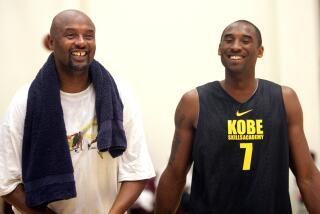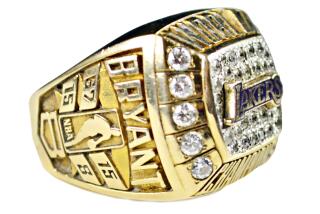Kobe Bryant compared to Chinese state-owned enterprises
Reporting from Beijing â What does Kobe Bryant have to do with the Chinese economy?
For the former head of Chinaâs state-owned enterprise commission, the Lakers star is a shining example of why government-owned companies shouldnât have to share the spotlight with smaller, privately owned companies, or the Steve Blakes of China, if you will.
Li Rongrong, the former chairman of the powerful State-owned Assets Supervision and Administration Commission, said state-owned companies and private companies should cooperate in the marketplace but that the âthe former should take the starring role, like Kobe does for the Los Angeles Lakers in the NBA,â the official New China News Agency reported.
Li, who was speaking in Beijing on Sunday at the annual Chinese Peopleâs Political Consultative Conference, a rubber-stamp legislature, added: âBy using only substitutes rather than using Kobe, the Lakers would not be able to win the game; by relying only on private enterprises, China simply cannot be competitive in the global marketplace.â
The metaphor did not go over the heads of Chinaâs basketball-savvy audience, many of whom consider Bryant their favorite player. But not everyone agreed with Liâs premise that government-owned companies always deserved the ball.
Thatâs because how you feel about the state-owned sector has become a litmus test of sorts in China about where you stand on reform.
Progressives, including Chinese Premier Wen Jiabao to some extent, believe that the state-sector has become too powerful at the expense of a more innovative and nimble private sector.
State-owned companies have benefited from years of cheap loans, favorable policies and little competition. Government companies dominate all the most lucrative areas of business, from telecommunications to energy. Meanwhile, private companies have famously struggled to get loans from Chinaâs state-dominated banking sector.
The World Bank and a Chinese government think tank released a report last month that identified reducing the power of Chinaâs state business monopolies as one of the keys to stability.
With many convinced that the state sector plays an unfair game already, Liâs comments were met with a barrage of witty dismissals on Chinese micro-blogs akin to Twitter.
âThe NBA doesnât have a rule that says only Kobe can take a shot,â wrote Wang Ran, a micro-blogger.
Economist Xu Xiaonian took a swipe at Li, noting his influence and proximity to the central leadership by writing, âThe difference between Kobe and the [state-owned enterprises] is that Kobe is not the eldest son of the referee,â the New China News Agency reported.
The agency also quoted the co-founder of the New Oriental School, Xu Xiaoping, as saying: âWhen Kobe is dribbling, others can challenge for the ball; when Kobe is shooting, others are allowed to block the shot.â
Still no word on whether the chairmen of state giants China Mobile, Air China and PetroChina think Bryant hogs the ball too much.
RELATED:
Chinaâs inflation rate drops to 20-month low
China lowers GDP growth target for the first time in 8 years
World Bank to China: Your economic model is âunsustainableâ
More to Read
Inside the business of entertainment
The Wide Shot brings you news, analysis and insights on everything from streaming wars to production â and what it all means for the future.
You may occasionally receive promotional content from the Los Angeles Times.











